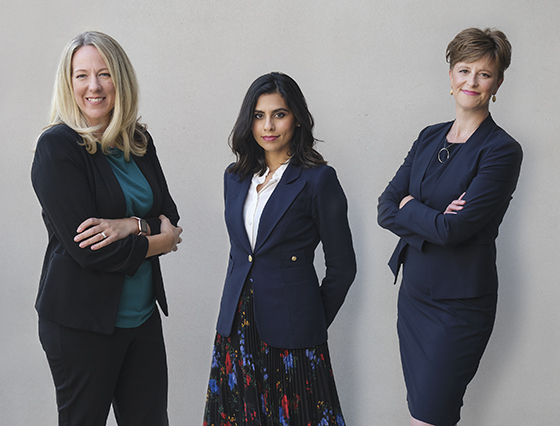
Landings LLP partners Jacqueline Swaisland (Queen's Law) and U of T Law alumnae Warda Shazadi Meighen and Erin V. Simpson (photo by Antonia Giroux Photography)
Warda Shazadi Meighen (JD 2009) says the decision to pursue her area of practice was personal: she and her family arrived in Canada as refugees.
“Looking back, it was an open-shut case for me. It was just a matter of getting more clarity as I went through the process of trying on different areas. But I knew in my heart,” says Shazadi Meighen, a graduate of the University of Toronto’s Faculty of Law.
Shazadi Meighen says her law school experience changed her life in ways she could not have thought possible.
A firm that was only recruiting at one other school, hired her to join them in New York where she worked on her first asylum cases. Through the firm’s partnership, she took a placement at the United Nations and she began to visit other parts of the world, leading to a master’s in migration and international refugee law at the University of Oxford.
“I can pinpoint where all of that came from, and it was U of T. The professors, my classmates, the opportunities, are fantastic. To this day, if I have a tricky question, I'll go to [Professor] Audrey Macklin.”
“Sometimes it's not clear how it will unfold, but I can trace all of my transitions back to U of T.”
Shazadi Meighen, fellow U of T Law alumna, Erin V. Simpson (JD 2013) and Queen’s University Law alumna, Jacqueline Swaisland, are founding partners of Landings LLP, a firm devoted to refugee, immigration and human rights law.
Their practice ranges from refugee and spousal applications, to compelling pro bono cases and constitutional challenges, to economic matters, such as corporate expansion in a new region.
“I wanted to start a firm with lawyers who are smart, kind, who really care about their work and are completely committed,” says Shazadi Meighen. “I’m just so lucky that they happen to be women.”
Simpson says that while the representation of women in law is still being talked about on Bay Street, their firm has felt very supported by their refugee and immigration bar.
“There are a lot of people who are critically reflecting on how the broader societal structures are playing out. How much power somebody really has in conversation, how much respect they command,” she says.
Simpson had an established career within international human rights organizations before making the decision to attend law school as a mature student.
"I was always so fascinated by the law. I was constantly coming up against it and was trying to figure out how the law could help our advocacy campaigns, or whether it was standing in the way,” says Simpson, who thought she would return to political advocacy after completing her JD degree.
“I remember week one of law school: I love the law.”
She chose U of T Law for its many in-house clinics and fellowship opportunities.
“I was an IHRP [International Human Rights Program] intern at UN Women in New York, then known as UNIFEM. It was an incredible experience and so formative. I still maintain those networks. It’s been so important to me."
After clerking for her articles at the Supreme Court of Canada and working on union labor and Charter issues at a Toronto firm, Simpson says health issues caused her to reassess and have the courage to start a refugee practice on her own, until co-founding Landings.
"The three of us have different areas of expertise and experiences. This [legal] area is so broad, and [there are] so many issues. We really are so much stronger together," says Simpson.
“We hand-picked each other as dancing partners,” adds Shazadi Meighen.
For the past four years, Simpson has been part of a team of nine lawyers challenging the Safe Third Country Agreement (STCA) between Canada and the United States. In July, a federal court ruled STCA violates the Canadian Charter of Rights and Freedoms.
Simpson represents the public interest groups in the case and works closely with Prasanna Balasundaram, a staff lawyer at Downtown Legal Services, U of T Law’s community legal clinic and clinical education program where Simpson was once a clinic student herself. Balasundaram represents two refugee applicants in the case.
Last week, the appeal by the Canadian Department of Justice was heard. Simpson says it could take weeks, or months, before a decision on the appeal is made. The decision will impact thousands of individuals who have been turned back under the agreement since 2016.
“At least 4,400 people have been turned back to the U.S., and the evidence is very clear, that U.S. immigration detention system doesn't meet international standards,” she says.
“[While the case has] totally dominated the first four years of my practice, I just feel honored and proud to be part of it,” says Simpson, who credits Professor Lorraine Weinrib for setting her on the course of a career in constitutional litigation.
The partners say among the challenges of launching a new firm in the middle of a global pandemic, are hiring and onboarding staff, virtually, to navigating a legal system that often requires in-person contact for practical reasons, such as preparing for trials and getting original signatures on documents.
They say shared calendars, regular check-ins between partners, lawyers, and staff, have been essential, as well as recognizing when something is not working.
"The inertia is to just do your file work and get things done. But it's important for everyone to feel human, well cared for and heard,” says Shazadi Meighen, who looks forward to the return of in-person meetings with clients when the pandemic ends.
“We’re all very people-focused. To have that connection is why we're in this practice.”

